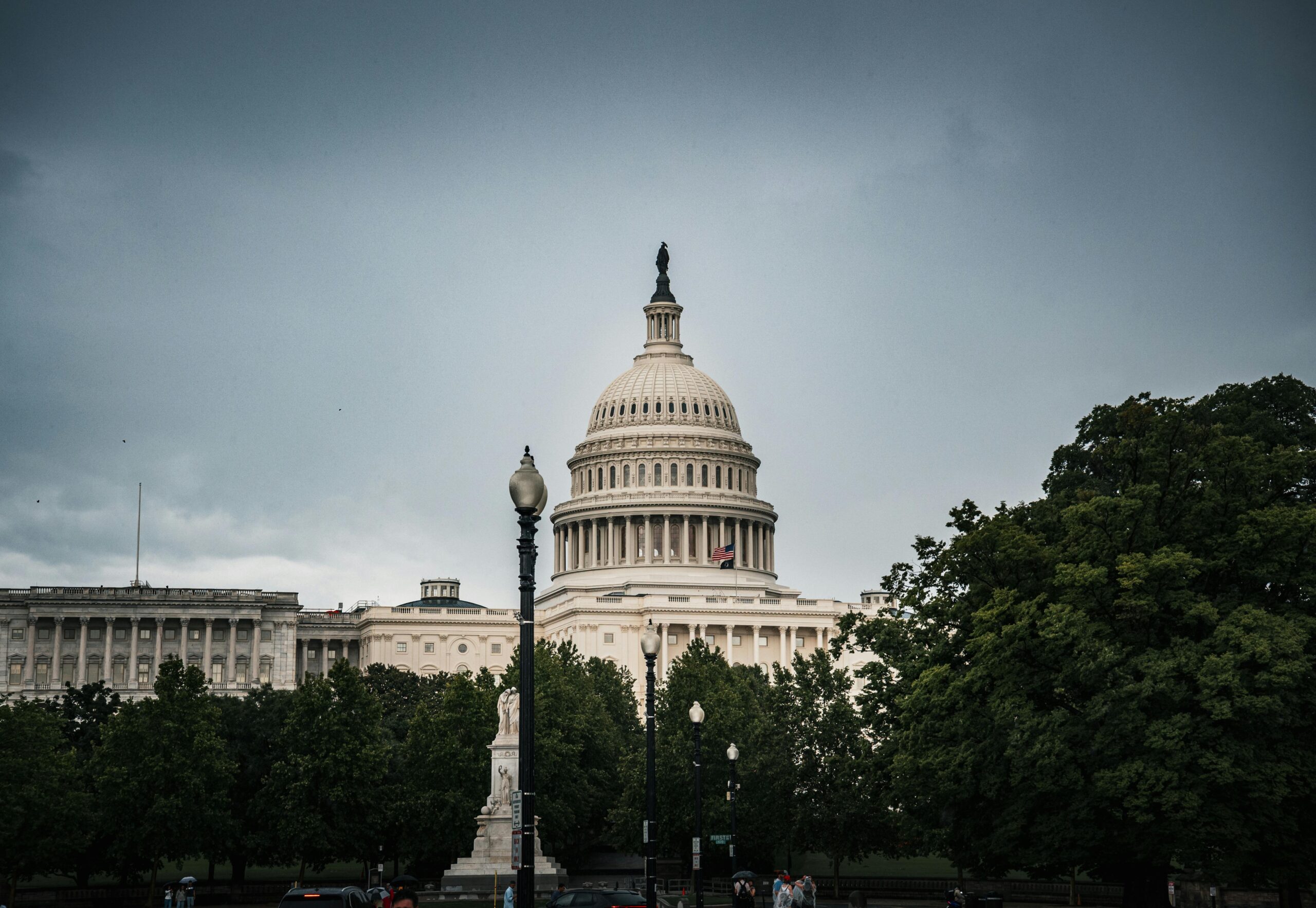Featured Blogs

Even as the use of artificial intelligence (AI) in health care has been on the rise for years, federal policymakers are currently grappling with how to address the intersection of health care delivery, innovation, and AI regulation.
As AI becomes more integrated into health care operations and clinical decision-making, policymakers face the challenge of establishing frameworks that promote innovation while addressing concerns around bias, transparency, and accountability.
Through understanding the current federal landscape and the actions already taken, we can get a clearer picture of the direction policymakers and stakeholders are going and the implications for the health care system.
Federal Policy Actions
Recent federal involvement in AI policy is primarily driven by policymakers’ interest in:
- addressing concerns about regulatory gaps for AI use;
- establishing accountability measures for organizations that utilize the benefits of AI; and
- and improving public trust in AI systems to encourage responsible AI use.
In Congress, the Senate HELP Committee recently held a hearing on AI’s potential to support patients, workers, children, and families. The hearing showcased both support for the positive impacts of AI in various work sectors and concerns about the need for proper oversight.
Various bills have also been introduced, including:
- S.2997, the Right to Override Act, by Sen. Markey (D-MA)
- H.R.5045, the Health AI Act, by Rep. Lieu (D-CA-36)
- H.R.238, the Healthy Technology Act of 2025, by Rep. Schweikert (R-AZ-01)
These bills represent 3 different types of legislation related to AI and health care; those that seek to mitigate negative effects, those that seek to understand it better, and those that seek to utilize it to improve the health care system.
The Trump administration has also been active in the AI policy space, through its America’s AI Action Plan, which was published in July 2025. This plan encourages the development and use of new AI systems in health care.
Specifically, the Center for Medicare and Medicaid has proposed the WISeR Model, developed to review Medicare payments for certain services. Many stakeholders have concerns about the model, including the American Hospital Association (AHA), which recognizes the benefits of AI but is worried that the algorithm may ignore patient-specific care details without proper guardrails and human oversight.
Implications of Federal Actions
These actions represent early attempts at governing AI in health care and highlight the desire from policymakers to utilize AI to improve health care while negating potential adverse impacts. But how do these actions impact different stakeholders within health care?
Let’s start by looking at providers. We are already starting to see more AI platforms designed to increase efficiency for providers, but new regulations could require training modules and newly formed committees to monitor AI use in these settings, possibly increasing barriers to entry. Additionally, as AI use becomes more common in making care decisions, providers are raising concerns that regulations will not adequately protect their ability to use clinical judgement.
Drug manufacturers are seeing success with AI modeling to increase efficiency in the drug development process and could expand use to other aspects of manufacturing. The FDA has established the Center for Drug Evaluation and Research (CDER) AI Counsel to oversee these developments, however further guidance and action could bolster or limit AI use in the manufacturing process.
The AI Counsel has not finalized any guidance, as there are concerns about how AI is being defined, and how credibility and risk of different AI platforms can be established. Drug manufacturers have been supportive of AI use at the FDA so far, however there are concerns from within the industry about the technology providing incomplete and incorrect summaries which could lead to slowdowns in the approval process.
When it comes to patients, they are still skeptical about what health care in AI means for them. In a recent study published in JAMA, almost two-thirds of people surveyed reported distrust in their healthcare system’s use of AI and concern that AI could harm them.
This finding indicates a need for lawmakers to implement policies that increase confidence and trust in AI for patients to feel comfortable with ongoing AI use. This could require a change in approach from the Trump administration which has generally taken a view that stresses protecting AI innovation from overregulation.
Ongoing Policy Issues
While there has been movement regarding policies related to AI and health care, there are still some issues that will need to be addressed in the future.
- Equity and Bias: Some stakeholders, like the AHA, have expressed concerns that AI tools could possibly be biased or discriminate against patients, providing substandard care.
- Health Care Workforce: Both the AHA and the American Medical Association (AMA) have been supportive of expanded AI use to help address provider burnout, so long as it enhances providers’ work rather than replacing it.
- Oversight: The Biotechnology Innovation Organization (BIO) has previously stated that the organization supports an incremental approach to oversight and regulation to allow sufficient time for adaptation. The AMA emphasizes that providers must be included in oversight conversations to ensure that the technology is supportive for care.
What’s Next
AI in health care is no longer just a possibility; policymakers are actively grappling with its deployment for providers and payers. Decisions made now will impact how AI is utilized and perceived implicating access, quality, and cost of care for patients for years to come.

After a whirlwind of votes and a stroke of a pen, the longest federal government shutdown in history has come to an end. However, the deal to reopen the government is only in effect for a few weeks and advance premium tax credits (APTCs) expiration is looming. With only a few more days before leaving town again for Thanksgiving, can lawmakers make progress on their stalled agenda? There’s only one way to find out, so let’s get into it. Welcome back to the Week Ahead!
The Administration
President Trump weighed in on the health care debate on Truth Social (where else!?), saying that Republicans in Congress should redirect the APTCs from the insurance companies directly to the people. The post offered no details on how exactly that would work, but one idea coming from Republican lawmakers and conservative think tanks, such as the Paragon Institute, would be to put the funding for APTC credits into health savings accounts (HSAs) for individual enrollees to use. Another option that has been suggested is to provide the APTC credits to enrollees through flexible spending accounts (FSAs). Beefing up HSAs and FSAs is not a new idea in Republican circles, but the President’s call to action doesn’t mean Republicans are ready to sub in HSAs for APTCs.
The debate over APTCs is not the only issue on the administration’s health care policy plate. There are also the 29 regulatory actions from the Department of Health and Human Services (HHS) currently at the Office of Management and Budget (OMB). These include the final rules for calendar year 2026 (CY 26) End-Stage Renal Disease Prospective Payment System (PPS), Hospital Outpatient PPS, and Home Health PPS. These rules go into effect January 1, and the Centers for Medicare and Medicaid Services (CMS) has already lost valuable time due to the shutdown.
The Senate
The Senate has been in session throughout the shutdown, working on the continuing resolution (CR), which ultimately led to the reopening of the federal government. Now, after a short break, it’s right back to work for the upper chamber as Senate Majority Leader John Thune (R-SD) promised a vote “in mid-December” on APTCs to get enough Democratic votes to pass the CR. In addition to APTICs, there has also been discussion of a concurrent vote on a Republican health care “reform” bill. This may include reallocating funding for APTCs to HSAs or FSAs for enrollees to use. There have also been discussions about a proposal to extend the APTCs with reforms such as an income cap, guardrails to prevent improper payments, and stricter eligibility/oversight measures.
All of these discussions will come to a head when the Senate Finance Committee meets for a hearing on November 19 regarding the rising cost of health care. This will be an opportunity for Senators on the Committee that oversees APTCs to discuss the future of the subsidies. It’s a battle royale for health policy wonks when the conservative American Action Forum (AAF) and the Paragon Institute and the progressive Urban Institute square off on the idea of redirecting ACA subsidies to tax-free accounts. It’s especially interesting since AAF recently published a piece expressing concerns about the idea of redirecting APTCs to tax-free accounts. We expect Democratic members of the committee to generally emphasize the importance of extending the APTCs, but it will be important to monitor any signs that Democratic members are open to any reforms.
Other Health Care Hearings This Week
- November 19: Senate Finance Committee executive session to vote on the nomination of Thomas Bell to be the Inspector General of HHS
- November 19: Senate Aging Committee hearing on restoring trust in medicines
The House
The House returned on November 13 after being out of session since the end of September, and the chamber faces a daunting to-do list. The House is reportedly going to consider legislation requiring the Department of Justice (DOJ) to release information related to the Jeffrey Epstein investigation on November 18. House Speaker Mike Johnson (R-LA) has also indicated he plans to bring forward a bill to repeal provisions of the recently passed CR that would allow for Senate offices to sue the federal government for unauthorized disclosure of Senate data.
Even with all this going on, House appropriators are also feeling pressure to make progress on FY 26 funding bills for those that were not included in the CR. According to our conversations with House Appropriations Committee staff, the Defense appropriations bill is rumored to be up next for consideration, and the plan would be to pair it with other appropriations bills. This lines up with conversations on the Senate side about advancing a minibus of appropriations bills, including for Defense. The Senate has yet to advance its version of the Defense appropriations bill, but our conversations on the hill indicate that it could be considered as soon as the week of November 17 or the week after Thanksgiving.
House Republicans will also face continued questioning about what they plan to do on APTCs. Speaker Johnson has not indicated that he would take up a bill to extend the enhanced ACA tax credits, but he may face political pressure, especially from House GOP members who are defending vulnerable seats in the 2026 midterm elections. On the other hand, bringing up a vote on extending the enhanced ACA tax credits could be divisive, since it would be something many members of his caucus would oppose, and he would need Democratic support to pass it.
House Health Care Hearings this Week
- November 18: House Energy and Commerce Oversight Subcommittee hearing on AI chatbots
- November 19: House Ways and Means Health Subcommittee hearing on preventing and treating chronic diseases
There You Have It
Congratulations to the Washington Spirit, which will play in its second consecutive National Women’s Soccer League Championship game, and its fourth in club history, on November 22. Do you have a favorite fall sport? Let us know. Make it a great week!
On October 29, 2025, the Senate HELP Committee held a hearing on the future of biotech. The members heard testimony on the current state of biotech in the United States as well as how to address coming challenges. There was strong bipartisan support of the need for domestic drug manufacturing and maintaining US competitiveness in the global arena.
Opening Statements
Witness Testimony
- Lowell Schiller, JD, Nonresident Senior Scholar, USC Schaeffer Institute – Testimony
- John F. Crowley, JD, MBA, President and CEO, Biotechnology Innovation Organization (BIO) – Testimony
- Josh Makower, MBA, Yock Family Professor of Medicine and Bioengineering, Byers Family Director and Co-founder Stanford Mussallem Center for Biodesign, Stanford University Schools of Medicine and Engineering – Testimony
- Aaron S. Kesselheim, JD, MPH, Professor of Medicine, Harvard Medical School/Bringham and Women’s Hospital – Testimony
- Reshma Ramachandran, MPP, MHS, Assistant Professor of Medicine, Yale School of Medicine – Testimony
Member Discussion
Domestic Manufacturing
The most widespread concern from members, including Sens. Banks (R-IN), Blunt Rochester (D-DE), Kaine (D-VA), and Chairman Cassidy (R-LA), was how to encourage domestic manufacturing of biotech. Sen. Blunt Rochester highlighted the lack of a national comprehensive plan to address US biotech innovation and manufacturing. When asked by Sen. Banks about ways for the Food and Drug Administration (FDA) to improve manufacturing, Mr. Schiller indicated a need to update regulations for modern technology and processes as well as have parity between domestic and global inspection standards. Chairman Cassidy raised the potential of using robotics to support domestic manufacturing of generic drugs, but Mr. Schiller responded that the upfront capital needed to open a robotics-based plant makes it unobtainable for companies.
Funding and Staffing Changes
Sen. Murray (D-WA), along with Sens. Hickenlooper (D-CO) and Blunt Rochester (D-DE), expressed concerns that funding changes to the National Institutes of Health (NIH) will greatly reduce US competitiveness and innovation in biotech due to decreased research. All 5 witnesses agreed that the funding changes pose serious risks to innovation and continued drug development. Dr. Ramachandran specifically highlighted the negative impacts on patients due to the cancellation of clinical trials and the brain drain that is occurring as scientists find employment opportunities in other countries. Mr. Crowley emphasized the important role that the NIH plays in basic and translation research, which builds the foundation for startup biotech companies and encourages investment capital from academic institutions and private organizations.
Similar concerns were raised about layoffs at the FDA and the Centers for Disease Control and Prevention (CDC). Sen. Kim (D-NJ) asked about current challenges with FDA resources, to which Dr. Makower responded that vacancies needed to be filled at a one-to-one rate to keep up with the workload of approvals, manufacturing plant inspections, and questions from biotech developers. Dr. Ramachandran highlighted the need for CDC action and surveillance to address growing public health concerns, like drug resistant super bugs, that have biotech solutions, novel antibiotics.
Cost
Sen. Sanders (I-VT) was the first to raise the point of the high cost of pharmaceuticals, often out pricing patients who cannot afford their medications. Dr. Ramachandran shared her experiences where patients request to skip a month of one of their medications or choose not to fill a prescription after seeing the cost at a pharmacy. Sen. Hassan (D-NH) suggested biosimilars could be a way to decrease costs if they can be brought to market quickly. Dr. Kesselheim agreed but elaborated that efforts need to be made to encourage prescribing of biosimilars as well as regulatory guidance to allow them to be interchangeable with their counterparts at pharmacies.
Sen. Hickenlooper questioned if there have been any negative outcomes on negotiating drug prices under the Inflation Reduction Act (IRA). Dr. Kesselheim stated there have been no changes to innovation and the results have only showed drug prices can be decreased. Sen. Cassidy followed up, trying to understand if there has been a difference in investments by biotech companies because of the IRA. Mr. Crowley stated the largest result he has seen is the focus shift from small to large molecules.
Possible Regulations
Sen. Moody (R-FL) asked what regulatory improvements could be made to improve the FDA. Mr. Crowley expressed the need for faster, clearer guidance from the FDA through the approval process. He also suggested the consideration of surrogate endpoints or risk/benefit assessments for rare disease therapies.
Sen. Kaine wanted input from the panel about the Vaccine Injury Compensation Program and whether reform was needed. Dr. Kesselheim expressed support for the VICP, especially how it supports US production of vaccines. Mr. Crowley was also supportive of the program, stating that the system works and should be preserved and strengthened.
Chairman Cassidy led the conversation about the 3rd party review process for the FDA, questioning why the FDA will re-review approvals. Dr. Makower expressed the variable quality for 3rd party reviews and the need to implement a quality control process if there is a desire to increase 3rd party usage. Dr. Ramachandran echoed the point and discussed the need for greater oversight.

We recently welcomed Katie Meadows as Research Associate. We sat down with Katie to talk about her background, what she thinks are the biggest challenges in health policy right now, and how her skills and experience will be an asset to our clients.
Tell us a little about your background and how that background prepares you for this new role.
I’m a proud double Hoya with an MS in Health and the Public Interest and BS in Human Science and Public Health, both from Georgetown University. While completing my degrees, I interned at the Substance Abuse and Mental Health Services Administration and volunteered with a student-run health and science advocacy organization. These experiences gave me the chance to explore federal policy from multiple angles and gain experience working to accomplish shared goals. In my new role, I hope to leverage these skills and experiences to support the needs of Chamber Hill Strategies’ clients.
What drew you to join a government affairs firm with a health care focus?
I wanted to find a workplace that would enable me to explore many areas of health care policy and gain applicable experience. I was drawn to Chamber Hill Strategies due to the firm’s bipartisan focus and broad reach in areas such as Medicare/Medicaid reimbursement, rural health, and the health care workforce. Working for a firm with such a diverse group of clients will allow me to build a strong professional foundation.
What are the core areas of health care policy you’re most passionate about or experienced in?
One area of health care policy that I am very passionate about is mental health and well-being, especially for children and adolescents. While there has been a growing focus on the area, there are more steps to be taken to ensure that children receive the care they need. I am interested in gaining experience in the current health insurance landscape so I can better assist clients in navigating this space.
What do you see as the biggest challenges (and opportunities) in health care policy right now?
Some of the biggest challenges that I currently see in health care policy are ensuring access to quality care and addressing the growing health care workforce crisis. Many communities, such as those in rural or underserved areas, continue to face barriers to care due to high costs, hospital closures, provider shortages, and limited access to services. At the same time, many providers are experiencing high patient loads, burnout, and system-wide staffing shortages. These issues, both separately and combined, impact the timeliness of care and create roadblocks to improved population health.
What will your role at the firm entail — what are you looking forward to doing here?
I currently produce the firm’s daily health care policy report, PolicyCrush, along with the weekly report on upcoming events. I also analyze policy both in legislation and regulation. I am looking forward to gaining experience and learning from my colleagues at Chamber Hill Strategies. The mentorship that I have already received has been invaluable. I am excited to continue to grow in my role and continue supporting the firm’s work on behalf of our clients.
How do you like to approach problem-solving in complex policy settings?
For complex issues, I think it is important to understand how different parties are approaching the problem and what their goals are. From there, I try to find commonalities between the different approaches to foster discussion on finding a shared way forward.
Outside of work, what motivates you or keeps you energized?
I love spending time with my friends and family, exploring all DC has to offer. Whether it is finding new coffee shops and restaurants to try or visiting the Smithsonian museums, I enjoy taking the time to connect with the people and world around me.
What else should your colleagues or clients know about you?
I am always looking for new book recommendations, both insightful and fun, as I find reading a good way to relax and escape for a bit while still learning. I also love to travel and explore new countries, especially trying local foods.
Do you have any book or travel recommendations for us?
One book I recently read was Everything is Tuberculosis by John Green, an author I grew up reading. I enjoyed seeing a new side of his writing and the way he highlighted a longstanding global health challenge. In terms of travel, one of my favorite cities I recently visited is Florence, Italy. I would love the chance to visit again.





